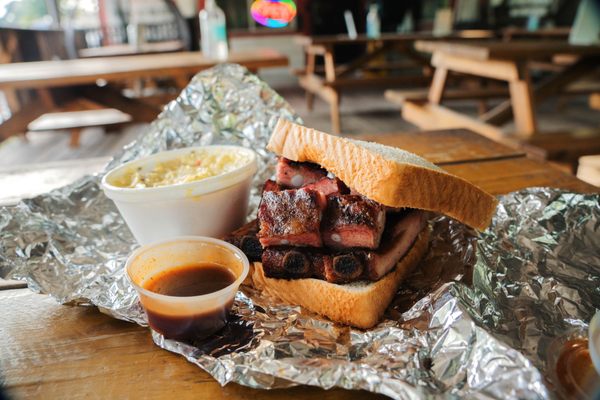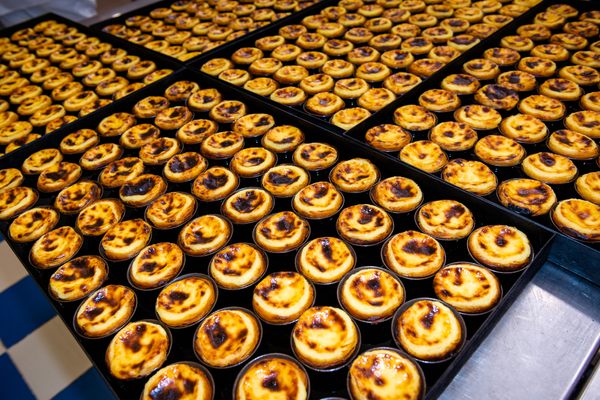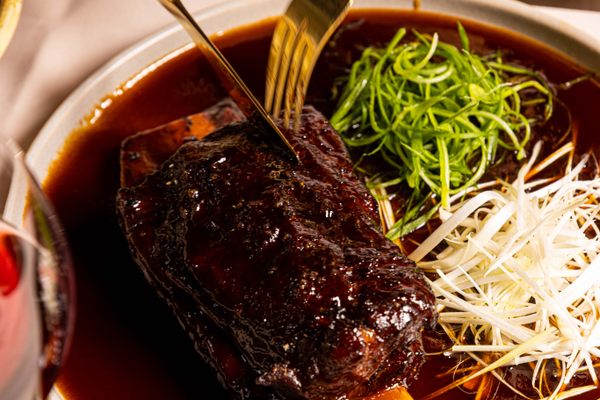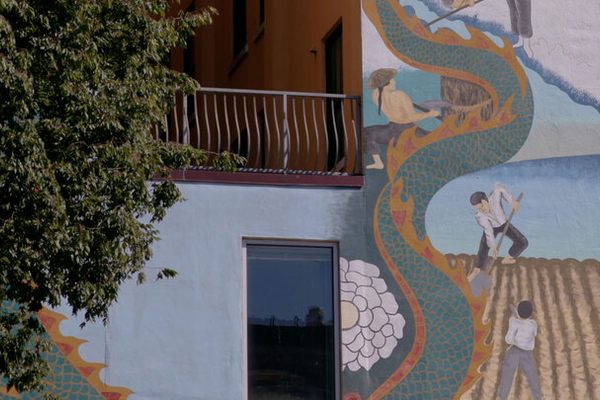

A Gastro Obscura Guide to Beijing
In China’s capital, try edgy beers and desserts fit for an empress.
The food of a city reflects the mindset of its people. The people of Beijing value inclusivity, forthrightness, and pragmatism. They also possess a deep sense of pride in their history, which is reflected in their local cuisine.
With a keen awareness of their cultural heritage, Beijingers have found innovative ways to revive and modernize age-old food practices. Cooks have turned to the past for inspiration, using traditional ingredients, cooking techniques, and even cues from the visual arts to create something entirely new.
A Palace Tea
Stepping into the Forbidden City instantly transports you to the past. Nowhere is this more true than inside Kunning Palace, or the Eastern Court of the Palace of Earthly Tranquility. Here, the empress and imperial concubines once gathered together to savor afternoon refreshments.

Kunning Palace was historically considered the empress’s official residence, though few actually lived there. Today, it hosts the Forbidden City’s Wanchun Jinfu (Ten Thousand Years of Prosperity and Fortune) afternoon tea. As one of the most sought-after afternoon teas in all of China, getting inside is an event in itself. The anticipation only builds as you wait in a long line.

It may be a tourist experience, but afternoon tea at Kunning Palace offers insight into the tea culture of the imperial court. All desserts and beverages are elegantly presented in traditional tableware. Imagine enjoying a cappuccino in a blue-and-white porcelain tea bowl, adorned with a cocoa-dust Chinese character 福, meaning fortune. Then there’s the “Fortune and Longevity with Tea Fragrance,” a green tea mousse infused with a delicately sweetened cream.
Make sure not to miss the fragrant waxberry and Smiling Concubine juice. Smiling Concubine is a type of lychee, and the name is a reference to a tale from the Tang Dynasty, when Emperor Xuanzong sent lychees to his beloved concubine Yang across a vast distance. Sipping the ice-cold, sweet-sour juice offers unexpected relief from summer heat.

A Tale of Two Cafés
Stepping into Fusan Café & Bar is like entering a tranquil Chinese ink-wash painting. The warm, earthy tones of the décor, coupled with soft lighting and comfortable seating, creates a welcoming atmosphere that encourages relaxation and conversation.
Fusan offers robust espressos and velvety lattes, but give the pot of jasmine tea a try, especially here in Beijing where it’s a beloved favorite. Beijing’s natural water is slightly alkaline, making it less than ideal for brewing tea. However, the aroma of jasmine tea masks the water’s saltiness and bitterness. Empress Cixi of the Qing Dynasty was a devotee of jasmine tea, and her preference influenced the nobility, officials, and eventually even the commoners to follow her lead. At Fusan, the invigorating aroma and subtle bitterness of their jasmine tea complement the artistic pastries perfectly.
Consider trying the Summer Bamboo dessert, a vibrantly green mousse with a fresh matcha flavor. There’s also the aptly-named Rock, with its shape and color inspired by mountains in traditional Chinese art. The dessert might look like a hard stone at first glance, but it’s the complete opposite: a tender and light chocolate mousse, flecked with orange marmalade, sitting atop a layer of fluffy caramelized chocolate hazelnut cake.
Over on Qianmen Street, once a bustling historical and commercial hub 500 years ago, the dazzling People’s Cafe stands in stark contrast to the more calming Fusan. Its décor of bright red and shimmering silver is combined with cultural and patriotic symbols from different periods of Chinese history. In the center of the room stands a statue of the God of Fortune. Tasting a hot latte adorned with an edible rice paper image of the God of Fortune, you can’t help but wonder if the deity would appreciate this tribute.

Duck Dynasty
In Beijing, options abound for savoring Peking duck. However, for those inclined toward tradition, Family Liu’s Private Home Cuisine offers a legacy spanning centuries.
The proprietor’s ancestors were the renowned “Duck Liu” family, credited with breeding the ideal birds for the dish. The restaurant is located within a siheyuan (quadrangle courtyard), a traditional Beijing residence. Tables are arranged in the courtyard, which is covered with a glass roof, allowing diners to enjoy the transition from daylight to dusk as they savor their meal.
The duck skin is crispy on the outside, but richly juicy on the inside. Visitors are taught the authentic way to enjoy Peking duck: Besides the meat and sauce, only scallion shreds should be wrapped in the lotus leaf–shaped pancake, while cucumber and hawthorn jelly are served on the side to balance out the richness of the meat.
Alongside the duck, there are other culinary delights on the menu, such as Beijing-style handmade noodles with thick gravy, where a burst of Sichuan pepper will (pleasantly!) shock your taste buds. Or delve into the past with the Crispy Rice Crust Adorned With Three Delicacies, a vintage dish that the owner has brought back into the limelight.

Meditative Meals
The owner of Meditate Vegeta, Wang Yanding, wanted to build a snug sanctuary where she could serve vegetarian dishes to nourish both body and soul. The space, intentionally designed to be cave-like, reflects her belief that modern people can draw energy from the earth just as our ancestors did.
This Dongsi district restaurant is located close to the Peking Union Medical College Hospital. Even though Chinese feng shui considers the land next to hospitals to be inauspicious, Wang purposefully selected this location. Her goal is to offer comfort and nourishment, particularly to those grappling with illness and sorrow.
Diners enter a secluded private room, shielded from the clamor of the outside world. Only three set menus are offered, with each course showcasing the breadth and depth of Chinese vegetarian cuisine. Here, you can savor dishes like morchella (a type of fungi) in plum sauce and the Lotus Pond stir-fry. The noodles with five vegetables come in a rich pumpkin-based broth. The colors of the vegetables symbolize the five elements of Chinese philosophy: earth, fire, metal, water, and wood. The dish represents the entirety of the world, contained within a single bowl.

Boisterous Brews
The vibrant heart of Beijing’s beer scene beats at Jing-A Taproom. Here, beers are brewed with a touch of irreverence. Take the Airpocalypse Double IPA, with its formidable 100 IBU (International Bitterness Unit) rating. (For contrast, Corona Light has an 18 IBU.) This beer was created in 2014, the year Beijing experienced some of its worst smog in its history. Whenever city pollution skyrockets, the beer is offered at a discount.
The Yellow Mountain Radler commemorates an incident in 2019, when more than 10 million users of the bike-sharing company Ofo demanded their deposits back and left mountains of yellow bikes piled up around the city, while the refreshing Smashed Cucumber brew is inspired by one of China’s most beloved drinking snacks.
Speaking of drinking foods, don’t miss out on the brewery’s fried chicken, with its irresistible deep-fried peppers. And though they’re not traditionally Chinese, the sweet potato fries are delightful, especially when paired with a refreshing Chinese beer.

Dao Xiangcun No. 0
Established in 1895, Dao Xiangcun began as a small shop in Beijing’s Qianmen area. Today, it is the quintessential brand for traditional Beijing-style pastries and snacks, with 200 outlets in Beijing alone. In August 2021, the company opened their No. 0 shop. It offers the brand’s most classic pastries alongside new flavors exclusive to this location.
Start by filling a nine-piece box with the pastries of your choice. Be sure to include the ox tongue–shaped pastry and the flower-shaped flaky pastry filled with jujube purée, two traditional favorites. You can also select from the bakery’s new creations. Fans of Chinese classical novels, particularly Journey to the West, will delight in the opportunity to collect (and eat) pastries shaped like the story’s four main characters.
After paying, you’ll take your tray of treats to the other side of the shop. There, your pastries will be neatly arranged in the box and tied with a string. A tip: Chinese pastries are generally quite sweet, so enjoy them with a cup of tea.

High Culture
The newly-renovated ZSpace, a blend of café, restaurant, art gallery, and guesthouse, is located within a residential siheyuan. Whether you’re savoring morning coffee, afternoon tea, or a meal, opt to enjoy it on the rooftop, amidst the gray-white eaves of neighboring houses and the branches of venerable trees.
For a light lunch, try their roasted silver cod with XO sauce and wild rice. The fish is tender with a delicate sweetness, and its outer layer is lightly crispy and caramelized. The rice has both a soft and crispy texture, with ham enhancing its aroma and green beans adding a sweet note, tying the whole dish together.
Gastro Obscura covers the world’s most wondrous food and drink.
Sign up for our regular newsletter.
























Follow us on Twitter to get the latest on the world's hidden wonders.
Like us on Facebook to get the latest on the world's hidden wonders.
Follow us on Twitter Like us on Facebook